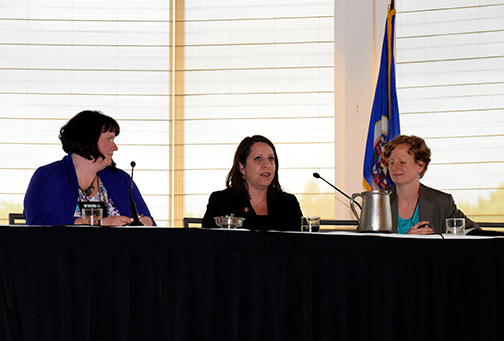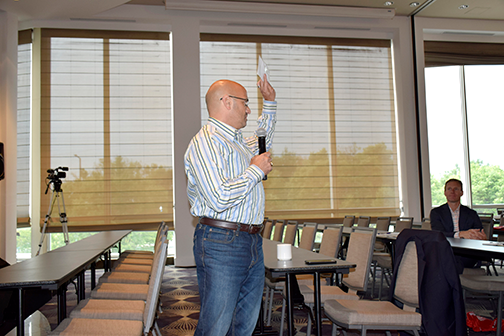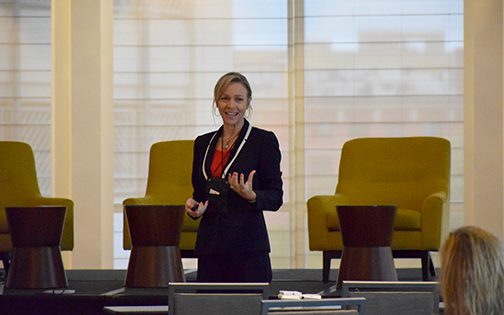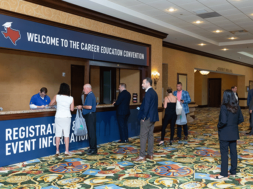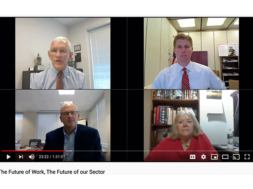
CSPEN Conference Brings Together Schools to Discuss Opportunities, Challenges
Proprietary college administrators are optimistic that a new administration will mean new opportunities for higher education. But with those opportunities will likely come challenges.
The 2017 CSPEN Annual Conference, held Aug. 16-18 in St. Paul, Minnesota, featured speakers that highlighted those issues.
The Central States Private Education Network is a third-party initiated, multi-state collaborative that promotes private education and the benefits those higher education institutions provide to non-traditional and traditional postsecondary student populations. Initially established to promote the interests of students and private schools in the states of Illinois, Iowa, Michigan, Minnesota and Wisconsin, it has since expanded its mission nationwide.
The state of accreditation
It’s the best of times; it’s the worst of times. For accrediting agencies, that famous line from Charles Dickens’ book, “A Tale of Two Cities,” couldn’t be more appropriate.
Bill Larkin, executive director of the Accrediting Council for Continuing Education and Training (ACCET), said they are currently dealing with two major issues: a drop in intensive English programs and an increase in applications for accreditation mainly from institutes who were accredited by the Accrediting Council for Independent Colleges and Schools (ACICS).
“The change in administration has been looked upon as a relief by many of our for-profits and vocational Title IV schools,” Larkin said. “But this has not had the same positive impact on our intensive English programs. The end result has been a dramatic drop in the number of students going to intensive English programs in the United States.”
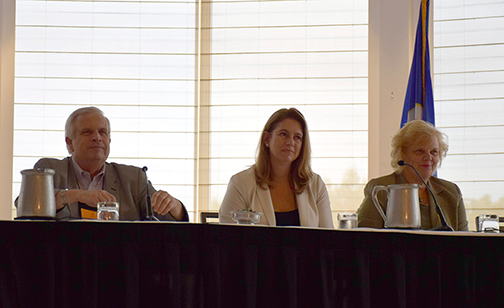
Many former ACICS-accredited schools need to gain accreditation from another agency after the Department of Education decided in December 2016 to no longer recognize ACICS. However, in September 2017, the new ACICS president said they would submit a petition to return as a national accreditor to the Department of Education by Oct. 1 and that they have asked to be included on the agenda for the spring 2018 meeting of the National Advisory Institutional Quality and Integrity (NACIQI). Nonetheless, past actions, such as a request for a temporary restraining order and a preliminary injunction to halt implementation of the DOE decision, have been denied.
Larkin said ACCET, the Accreditation Bureau of Health Education Schools (ABHES) and the Accrediting Commission of Career Schools and Colleges (ACCSC) are evaluating the applications of the former ACICS schools. “All three of us have between 95 and 115 locations that need to be accredited,” he said. “This has been an enormous undertaking for all three organizations.”
Education officials gave colleges 18 months to find a new accreditor and prevent students from losing access to government loans and grants. June 2018 is the deadline, although there are efforts to extend that.
Tom Netting, CSPEN co-executive director, said there are a number of groups and people working toward extending that 18-month window. “It looks like there is a … strong possibility that both the House and Senate appropriators will at least consider some type of limited extension,” he said.
But the accrediting agencies are moving ahead as if the deadline will not be changed. Larkin said ACCET has hired additional staff, run additional workshops and brought additional commissioners on board. “At the same time, we’ve been making sure we provide the same quality customer service that we’ve always provided to our existing members,” he said.
ACCET plans to visit 104 campuses within the next two accreditation cycles, Larkin said, noting that one cycle ends in December 2017 and the second ends in April 2018.

Joyce Laing, director of programs, curricula and financial assessment for ABHES, said they are also working to educate Washington D.C. legislators about accreditation so they better understand the impact of future legislation. “We remain collaborative with the Department … so that we can learn from each other and go through the processes, wherever they might lead,” Laing said. “In addition, we remain very much transparent as an agency with our own members, and with those that will be new members.”
But completing the site visits and the process for so many schools in an 18-month window is going to be difficult, if not impossible.
Larkin said the 18-month time period was passed many years ago in the Higher Education Act, but there was no real reasoning behind the time period. “It’s a totally unrealistic period in order for any of the national or regional accreditors to complete their accreditation process,” he said. “It can be done only if there are no deferrals, no delays and if everything goes perfectly.”
And things seldom go perfectly.
“Can we get all the visits done?” Larkin asked. “Yes, ACCET, ABHES and ACCSC have a game plan, and we will get all … campus visits done before that December 2017 deadline, and we’ll get all the branch campuses done prior to June 2018.”
Although they have scheduled a special commission meeting in June in order to defer institutions prior to the deadline, it’s going to make meeting the deadline difficult, particularly because ACCET is committed to following its policies and procedures, Larkin said. “Expectations on all sides are that we will do as complete, conscientious and comprehensive of a job as we possibly can,” he said, “but being able to do that within 18 months is very difficult.”
Laing agreed. “I think an extension would be helpful,” she said. “But realistically, we have to work with the framework that was provided.” In order to meet that deadline, ABHES has increased its number of commissioners to 15, increased its number of evaluators and committees, and added two more meetings for consideration of deferrals, she said.
Leah Matthews, executive director and chief executive officer of the Distance Education Accrediting Commission (DEAC), said in her 18 years working in the field, she’s never seen accreditation at the center of policy discussions like she has in the last few years.

CSPEN_BVU ALUMNI STORIES_2017 – Globe Education Network
However, despite all the tumultuous activity, DEAC has been pretty stable, and the reason for that is likely because the vast majority of their institutions do not participate in Title IV, she said.
“Out of our 102 accredited institutions, we have just 14 that are in federal financial aid programs,” Matthews said. “Most of them offer self-pace … pay-as-you-go associate, bachelor’s or master’s degrees.”
She said it is possible for schools to thrive in that kind of environment. “Our schools have really been able to hang in there in the wake of a lot of scrutiny on how Title IV money is used,” she said.
Matthews said she is concerned about the criticisms being aimed at accreditors, and in particular, national accreditation and student outcomes. “As the accreditors of these institutions and these students, we are proud of our work,” she said.
She also said it’s important to work together and determine how best to address the continuing negative narrative.
Foxx: What comes next for education
The House of Representative’s Committee on Education in the Workforce is focusing on reforms that will help people get the knowledge they need for employment, said the committee’s chairwoman.
“We’re going to do everything we can … to focus on reforms that help people get the knowledge and skills that they need to have a successful life and carry those skills into the workforce,” Congresswoman Virginia Foxx, R-N.C., said during the CSPEN keynote address.
Foxx said she also wants to get more people engaged in postsecondary education, and believes the best way to do that is by letting institutions and communities decide what’s best.
“We’re putting states, institutions, educators and the private sector in the driver’s seat to build successful workforce development programs that work best for their communities,” Foxx said. “We’re not trying to dictate in Washington a one-size-fits-all program.”
Foxx said they want to reduce federal rules and regulations because they require administrative costs, which reduces the amount of money that can go to direct services. “We’re going to provide relief to people by repealing unnecessary reporting requirements, addressing many of the harmful and misguided regulations imposed by the previous administration, like Gainful Employment. But we should do that while we also deliver strong common sense accountability in federal programs.”
The Workforce Innovation and Opportunity Act, passed in 2014, gave much control to the local level and built accountability issues, Foxx said. “We’ve now begun to evaluate what’s happening as we give hardworking taxpayer dollars to various entities. We’ll be able to see who’s being effective and who’s not …”
The Education Workforce Committee has also been working hard on the Reauthorization of the Higher Education Act, she said, noting that they plan to introduce that bill yet this fall.
Foxx said they have principles that guide them as they work on the legislation. “No. 1, we want to empower students and families to make informed decisions” about where they go to school, she said.
“It’s important that when students choose an institution, they have the best information they need to choose the right school for them,” Foxx said. “We need transparency and more information. We have reams and reams of data, but not so much information.”
Secondly, she said she wants to simplify and improve student aid. “The current system is a creature of the federal bureaucracy,” Foxx said. “It’s too confusing and complex for students and parents to navigate or understand.”
There are currently six different types of federal student loans, nine repayment plans, eight forgiveness programs and 32 deferred and forbearance options, she said.
“Streamlining federal aid will make it more responsive to the needs of the students,” she said. “This is going to include a simplified student system with only one grant, one loan and one work-study program. It will also help students and parents better understand their options and responsibilities when it comes to paying for postsecondary education.”

Foxx said her third priority is to provide relief for innovation, access and completion. “We need innovation that will make it easier for a student to earn a postsecondary degree or credential,” she said. “Many institutions have worked hard to create new ways to help their students receive an education, (using) innovative approaches like competency-based curriculums and online learning.”
Foxx said higher education should also honor more of a student’s prior learning.
“Let’s help our schools innovate,” she said. “Let’s get the federal government out of the way and help that to happen.”
As people become more sensitive and informed about the cost of higher education, schools will need to respond. “We are not … telling schools how much to charge,” she said. “That’s not the role of the federal government.”
But everyone hears sensational stories about student debt. “That’s what they are, sensational stories,” Foxx said. “We know that most students aren’t graduating with hundreds of thousands of dollars’ worth of debt, but some are graduating with a lot of debt. You all are smart to be coming together to talk about how you can fulfill your promises to students better, (and) how you can deliver your product (and programs) better. Those who do not do it are not going to survive.”
Foxx said her message to all sectors of education is to understand what’s happening. “People now have lots of choices, and you are a very viable choice because you produce results,” she said. “More and more, people are beginning to look at where they can get the best value for their money and their time.”
So where do we go from here?
One thing Netting, CSPEN co-founder, knows: It’s going to be a busy winter with regard to the Higher Education Act and education reform.
During the closing presentation, Netting predicted educational reforms would be better than what proprietary schools have endured for eight years. “But that doesn’t mean that the use of outcomes measures or other types of program integrity reforms aren’t going to be a discussion that we need to wade through,” he said.
However, the good news is collaboration and communication give the sector an opportunity to work with others and inform their community.
CSPEN is looking at being actively engaged in the negotiated rulemaking sessions, he said. “We will be putting forward names of

individuals from the CSPEN community and (are) hoping that we (will be) an active participant in the negotiations themselves,” Netting said, noting that CSPEN has shared information and research with the Department of Education. “Hopefully, that will hold us in good stead as the (DOE) starts to … look at who they’re going to bring forward to participate in negotiations.”
Netting said CSPEN would continue with its webinar series, and also hopes to provide monthly updates of what’s happening with legislation at the state level. Pending donations from schools, they hope to start first in five states, he said.
The CSPEN board has gathered a committee to build back the brand and its reputation, he said. “We’re going to take the data and the information and start to try and find ways, both on Capitol Hill and … elsewhere, to make sure that our story (the communities) is being told and people are reminded of the … students that you talk with on a daily basis.”
In addition, CSPEN wants to continue its charitable educational efforts by providing information and tools for its members. There will likely be a grassroots format and platform next year, but after that, Netting is hoping that schools will be able to contact their elected representatives through their smartphone.
“We can help drive information through templates, and give it to you to share,” he said. “You can then take the information literally with a touch of three buttons on your cell phone, and … send that information directly to your members of Congress.”
Netting said four or five key pieces of legislation being melded into the Higher Education Reauthorization Bill are of “considerable relevance” to the higher education market. “One is … the Transparency Act. It’s the legislation that literally … tries to do what we saw and witnessed earlier in the Workforce Innovation and Opportunity work that Minnesota does…” That is, trying to give valuable information to the consumer, versus a myriad of different forms of information and disclosures that no one reads.
Another major piece of legislation being worked is accreditation. “Accreditation is going to be a major portion of reauthorization,” Netting said. “They are trying to take accreditation back to its true roots.”
Under proposals being discussed, accreditation would no longer be an enforcement mechanism, but rather an assessment of true academic quality enrichment, Netting said. “That does include reforms, outcomes and issues of that nature,” he said. Portions of it could also address the need for regional versus national accreditation.
One thing guaranteed in the reauthorization bill is the ability to prevent individuals from over-borrowing, he said.
“It is with unanimity on Capitol Hill and all of the institutional groups and from many individuals – Democrats and Republicans alike – that one of the ways in which to answer the question of ‘student cost’ and ‘rising debt’ is to basically pull the throttle back some.”
Netting also predicts there will be reforms to the structure of the Department of Education. For example, colleges have a maximum timeframe to respond to an audit or a program review. He predicts the Department may now have a deadline when they must respond back to you.
“Congress is paying attention,” Netting said. “There will be reforms on the process. There will be reforms within the loan programs…”
Netting anticipates students will be able to consolidate loans more than one time, although he doesn’t believe students will see a reduction in the interest rate.

“Gainful Employment will either totally go away or … it will become a disclosure for all, every institution and every program,” he said. Netting also said he believes there will be a reverse of a lot of things regarding Borrower Defense to Repayment. “The changes that have been made to the process, for the better or for the worse, can be melded into something that is a workable campaign to protect students in the event that they truly are harmed,” he said.
Netting said schools should also pay attention to an ad hoc subcommittee formed and primarily driven by independent colleges and universities, and the nonprofit side of the higher education community “who have asked repeatedly for a review of the composite score and of the financial responsibility standards,” in hopes of bringing them into alignment with standards of generally accepted accounting principles and procedures.
Netting predicted the sector would also see a motion come out of the House and the Senate on risk sharing.
The biggest achievement, however, will be passing of the Higher Education Act. Netting predicted. “The House bill will be our high watermark and our high worth threshold,” Netting said. In the Senate bill, “we’re going to have to fight like hell to not have (it) totally watered down and diluted to the point of non-existence…”
2017 CSPEN Annual Conference
Saint Paul, MN | Aug. 16 – 18, 2017
